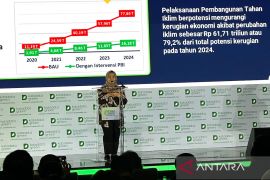Deputy Governor of Bank Indonesia Hendar said the 2,166 companies accounted for 95 percent of corporate debts in the country required to report to the central bank.
"Adoption of risk mitigation and prudential principles have been fairly good so far," Hendar said here on Monday. .
There are three reguirements in the prudential principles, according to the Bank Indonesia regulation.
The first is related to hedging ratio to mitigate losses of corporate debtors as a result of falling value of rupiah against the U.S. dollar. The central bank regulation rules hedging for at least 20 percent of the deficit in assets against liabilities in foreign exchange maturing in six months.
This regulation is effective since 2015 and the ratio is to be increased by phases annually.
Hendar said increase was also recorded in the number of corporate debtors reporting their hedging ratios.
The second requirement is related to liquidity ratio. The corporate borrowers of foreign exchange are required to have foreign exchange assets as much as 50 percent of their liabilities in foreign exchange maturing in the next three months.
The liquidity ratio regulation has also been effective since 2015 and the ration is to be increased from year to year.
The third requirement is related to the obligation to meet debt rating starting 2016.
Hendar said starting January 2016, a company borrowing money in foreign exchange is required to have a debt rating of at least BB- set by a rating agency recognized by the central bank.
In 2017, a corporate player of foreign exchange debt is required to make hedging transaction with Indonesian banks.
Meanwhile increase has been recorded in the volume of hedging transactions after the adoption of the prudential principles in the management of foreign exchange debts among non bank corporations.
In 2014, purchase hedging transactions by domestic companies were valued at US$36.81 billion , up 13 percent to US$41.61 billion in 2015.(*)
Editor: Heru Purwanto
Copyright © ANTARA 2016











